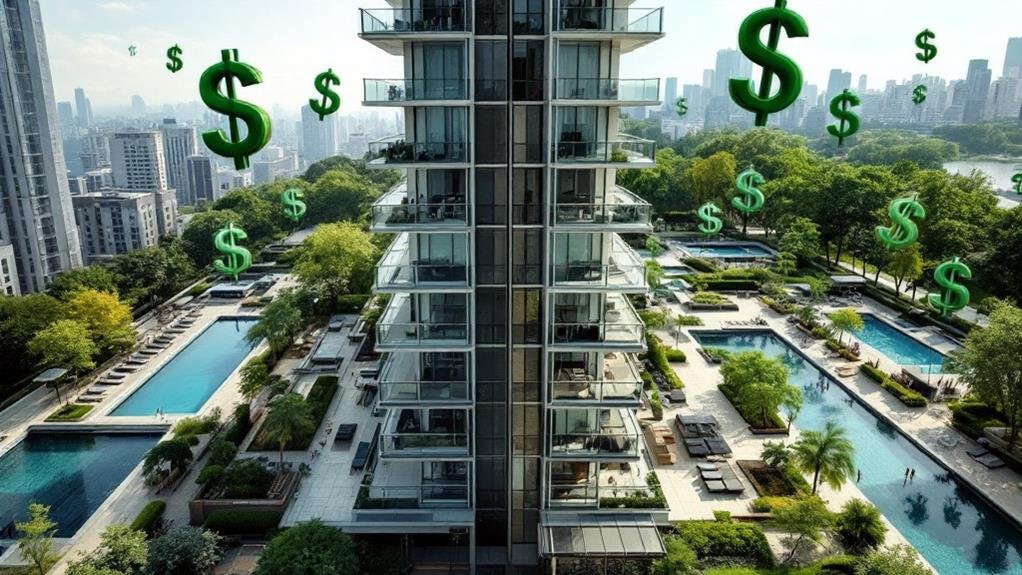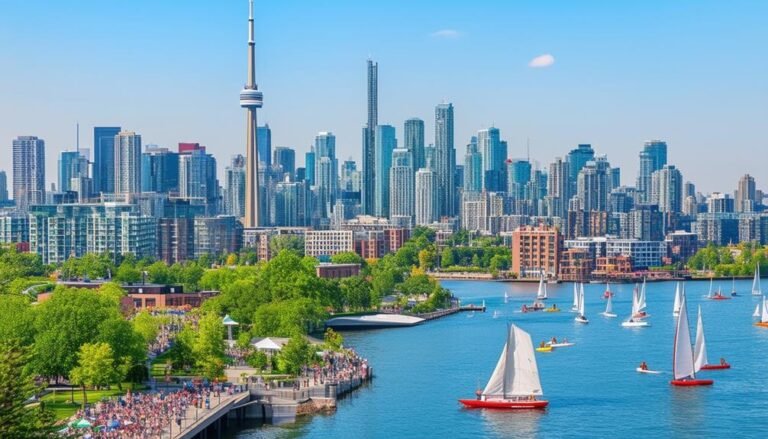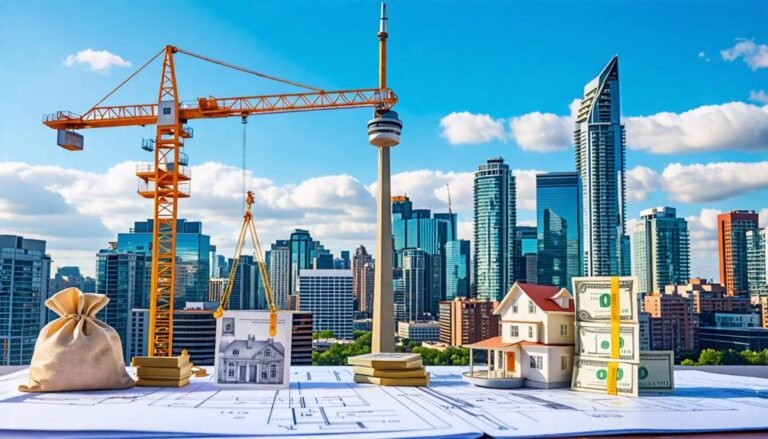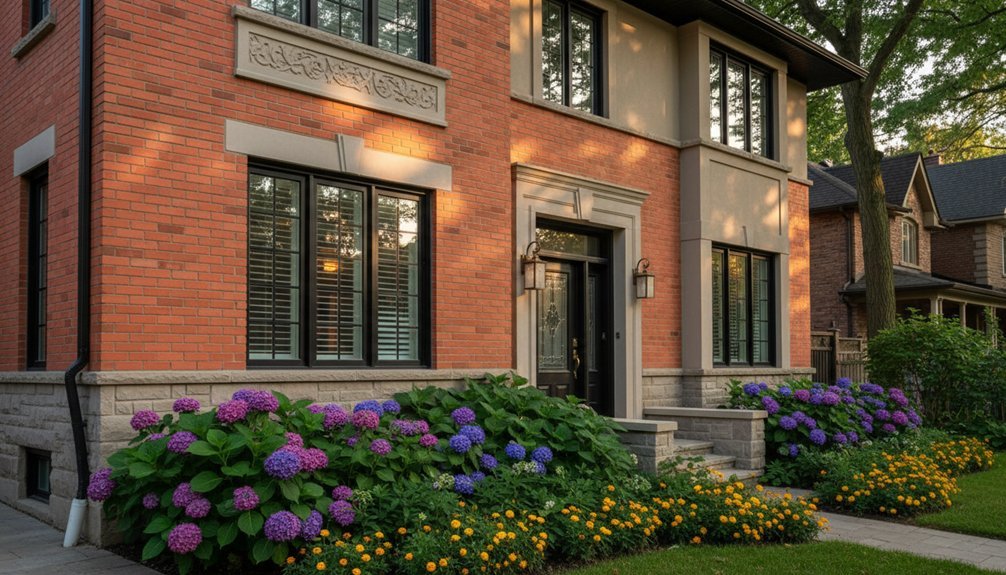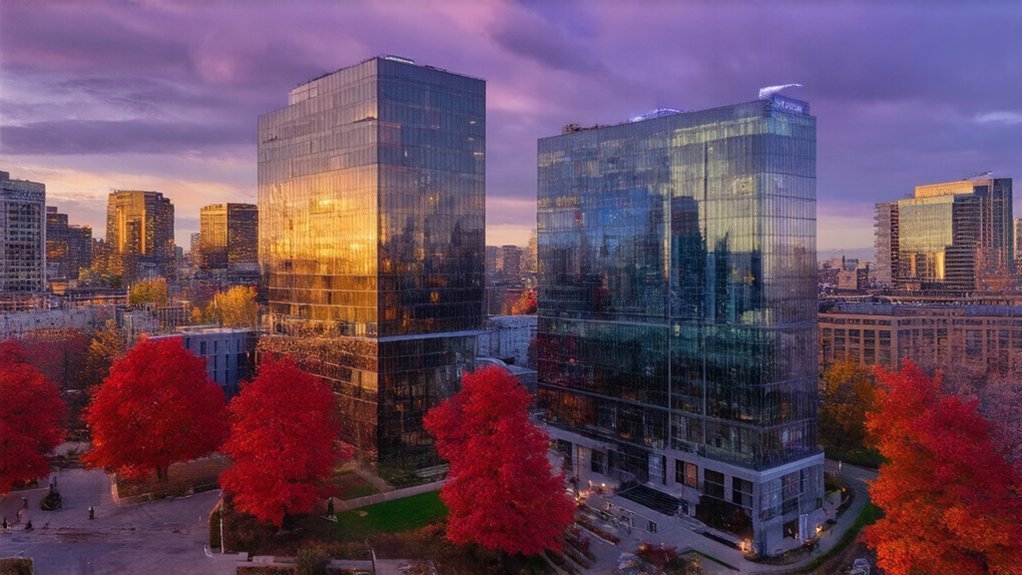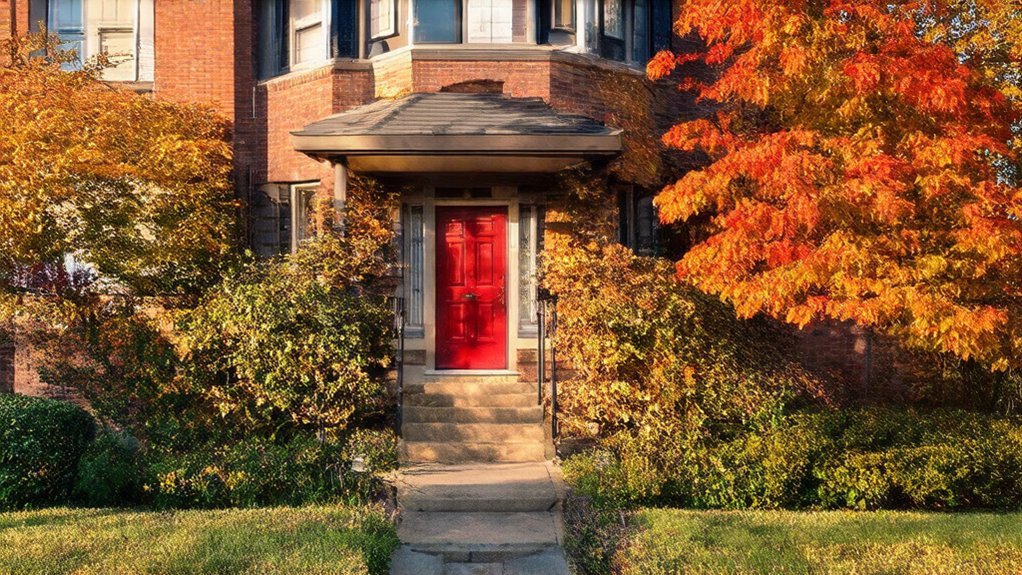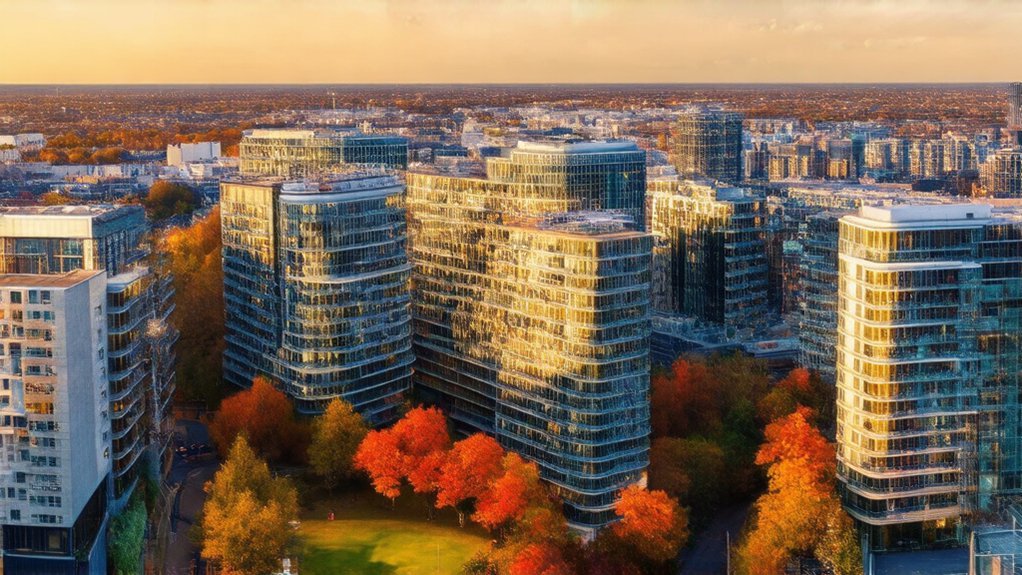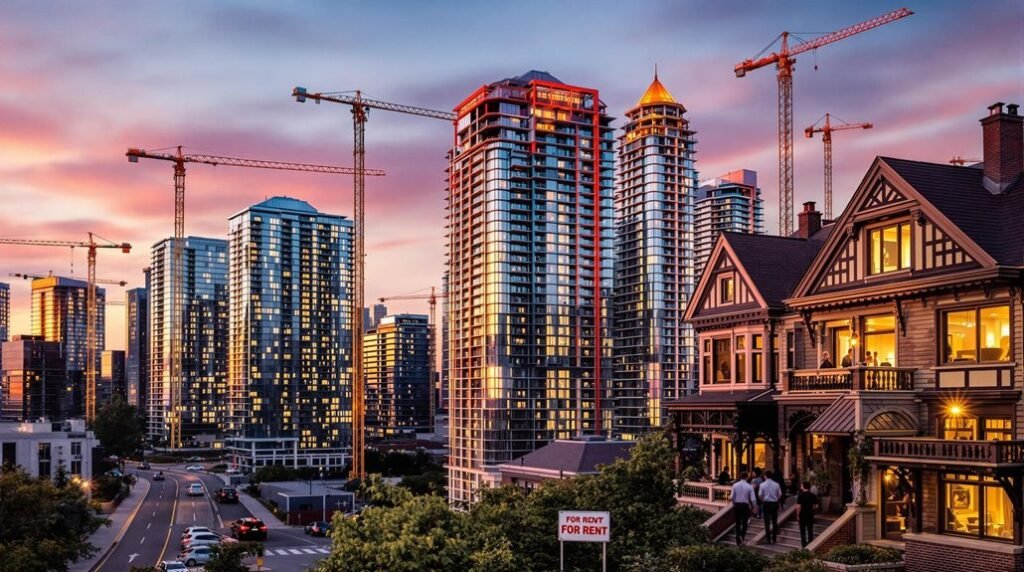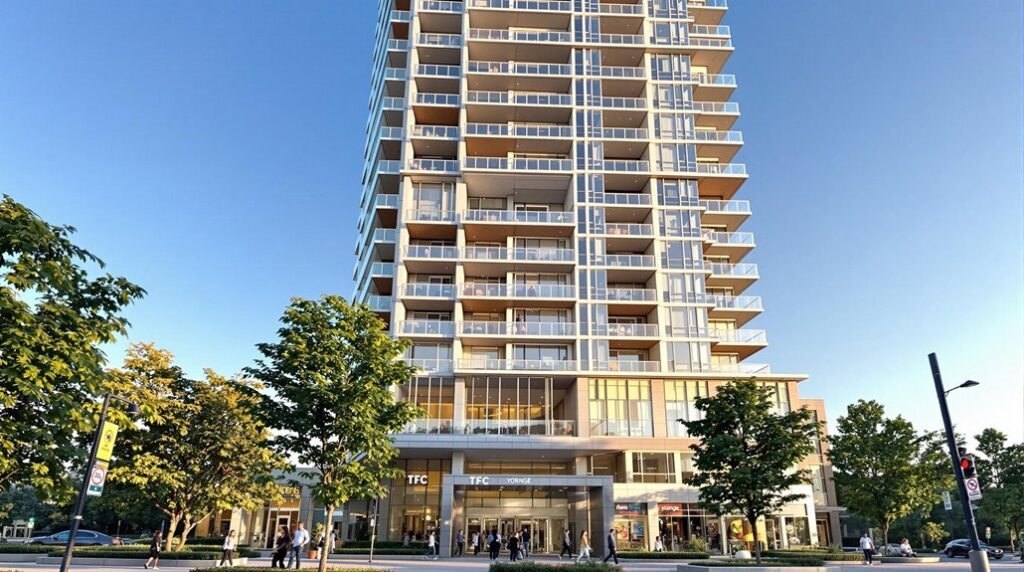Condo fees are monthly payments you'll make as a condo owner to cover shared expenses. They typically range from $0.40 to $1.00 per square foot, depending on your unit's size and building amenities. These fees cover maintenance, utilities, and contribute to a reserve fund for major repairs. Be prepared for potential fee increases of 3-5% annually. When buying, review the status certificate to understand the building's financial health and any upcoming special assessments. Remember, higher fees aren't always bad – they might mean better maintenance and amenities. Understanding condo fees is essential for budgeting and avoiding surprises. There's a lot more to unpack about these fees that can help you make a smart purchase.
Understanding Condo Fees
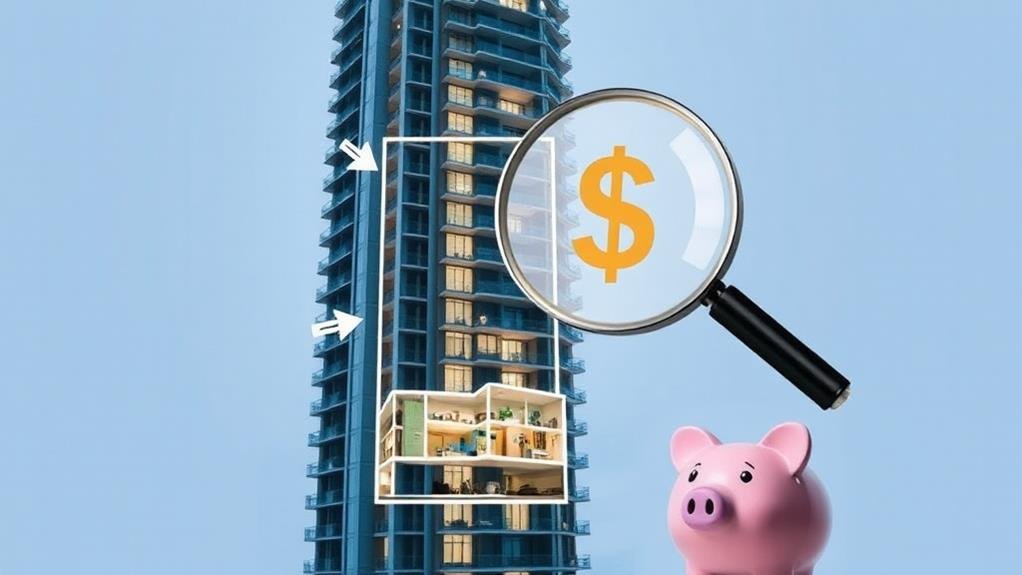
The complexity of condo fees often baffles new homeowners. Let's break it down for you! Condo fees, also called common expenses, are monthly payments you'll make as a unit owner. They're not optional – they're a must to keep your building running smoothly.
In Toronto's thriving condo market, understanding these fees is essential, especially with downtown core condos seeing significant price increases in recent years.
Here's what you need to know:
- What they cover:
- Maintenance of shared areas
- Utilities for common spaces
- Amenities like pools and gyms
- Property management costs
- How they're calculated:
- Usually based on your unit's square footage
- Typically range from $50 to $1,000 per month
- In Toronto, expect $0.50 to $1.00 per square foot
- The reserve fund:
- A chunk of your fees (15-30%) goes here
- It's like a savings account for big repairs
Condo fee transparency is key when you're house hunting. Don't be shy – ask for a breakdown of where the money goes.
It'll help you with budgeting for fees and avoid surprises down the road.
Fee Calculation Methods
Ever wondered how those condo fees are actually calculated? It's not as mysterious as you might think! Let's break down the fee structures and pricing variability you'll encounter. In today's challenging condo market, understanding these fees is essential for making informed decisions.
First off, size matters. Condo fees are typically based on your unit's square footage. The bigger your place, the more you'll pay. In major cities like Toronto, you're looking at $0.40 to $1.00 per square foot. That's why that penthouse comes with a heftier price tag!
But wait, there's more to it:
- The condo corporation's declaration outlines how expenses are split.
- Your parking spot or locker? Yep, those count too.
- Annual adjustments reflect the building's overall operating budget.
Don't forget about the reserve fund! It's like a savings account for big repairs, making up 15% to 30% of the annual budget. This helps avoid those dreaded special assessments.
Speaking of which, keep an eye out for potential special assessments. They're like surprise fees when the building needs extra cash. Understanding these fee calculation methods can save you from financial shocks down the road!
What Condo Fees Cover

Clarity about condo fees can save you from unpleasant surprises. When you're buying a condo, it's essential to understand what these fees cover. Let's break it down:
1. General upkeep: Your fees pay for cleaning, landscaping, snow removal, and garbage collection. This keeps your property looking great without you lifting a finger!
2. Big repairs: A chunk of your fees (usually 15-30%) goes into a reserve fund. This money's set aside for major fixes like roof replacements or elevator upgrades.
3. Utilities: In some buildings, especially older ones, your fees might include water and heating. Newer condos often have separate metering, though.
Monthly maintenance fees typically range from $200 to $500, depending on the building's amenities and services.
4. Staff salaries: From property managers to security guards, your fees help pay for the people who keep your building running smoothly. Got a full-time concierge? That's a big expense, costing up to $300,000 a year in larger buildings!
5. Administrative costs: Insurance for common areas and amenities is covered too.
Fee transparency is key! Don't be shy about asking what's included in your condo fees. After all, amenity maintenance isn't cheap, and you'll want to know exactly what you're paying for.
Reserve Fund Importance
While many condo owners focus on the immediate benefits of their fees, it's the reserve fund that truly safeguards your investment. This essential component typically makes up 15% to 30% of your annual budget. It's like a savings account for your building's big-ticket items!
Here's why the reserve fund is so important:
- Financial planning: It spreads out the cost of major repairs over time, usually 30 years. This means you won't get hit with a huge bill all at once when the roof needs replacing.
- Prevents special assessments: A well-funded reserve keeps those dreaded surprise fees at bay. Nobody wants to suddenly owe thousands for an emergency repair!
- Protects property values: A healthy reserve fund makes your condo more attractive to buyers. It's a sign of good management and financial stability.
When you're shopping for a condo, don't forget to check out the status certificate. It's like a report card for the building's finances.
A strong reserve fund means you can rest easy, knowing your investment is well-protected. So, next time you pay those condo fees, remember: you're not just paying for today, you're investing in tomorrow!
Factors Affecting Fee Amounts
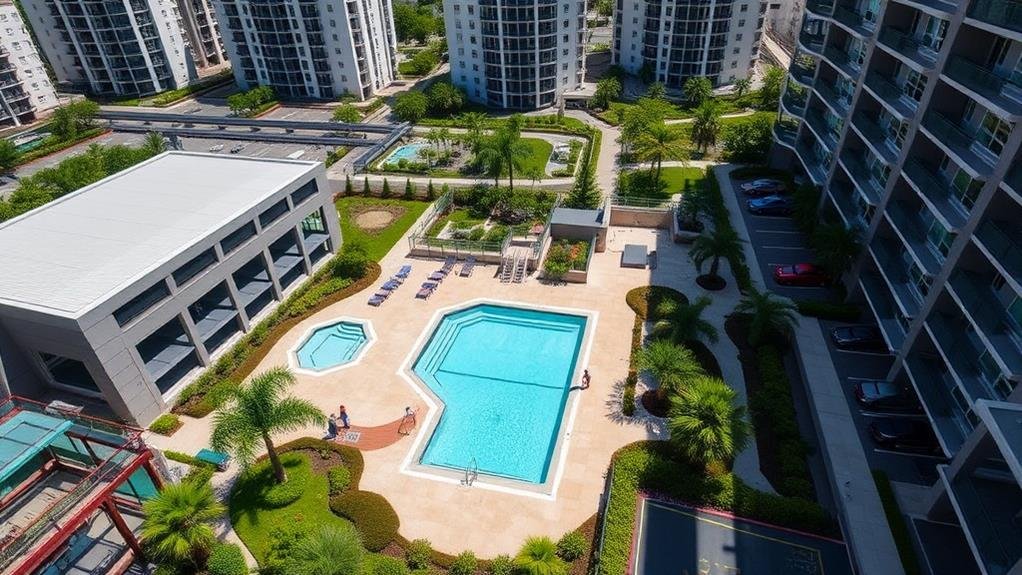
Now that you understand the importance of reserve funds, let's explore what actually determines your condo fees. There's no one-size-fits-all answer, but several key factors come into play.
First up: unit size. It's pretty simple – the bigger your condo, the more you'll pay. Fees are often calculated per square foot, usually between $0.50 to $1.00 in the GTA. So, if you're eyeing that spacious corner unit, remember it'll cost you more in fees too!
Building age is another biggie. Older buildings often need more TLC, which means higher fees to cover repairs and maintenance. It's like an old car – the older it gets, the more you spend keeping it running smoothly.
Location matters too. Prime areas often come with premium fees because, well, people expect high-quality amenities and services.
Speaking of amenities, they're a major factor. That fancy pool and 24/7 concierge? They're awesome, but they don't come free!
Lastly, don't forget about market trends and the economy. These can cause fees to fluctuate, just like everything else in real estate.
Special Assessments Explained
You've probably heard whispers about special assessments, and they might sound a bit scary. Don't worry, we'll break it down for you!
Special assessments are extra fees condo owners pay when unexpected costs pop up. Think of them as the condo's way of saying, "Oops, we need more money!" These fees usually cover big repairs or financial shortfalls that regular condo fees can't handle.
Here's what you need to know:
- Special assessment triggers:
- Major repairs (like a new roof)
- Unexpected financial issues
- Insufficient reserve funds
- Evaluating financial impact:
- Fees are often based on unit size
- Larger units may pay more
- Costs can reach thousands of dollars (yikes!)
Before you buy a condo, do your homework:
- Check the status certificate for pending assessments
- Review the condo's financial health
- Ask about the reserve fund
Fee Increases and Budgeting

Just as you need to be prepared for special assessments, understanding fee increases and budgeting is key to managing your condo finances.
Condo fees typically go up each year, based on the budget approved by your condo corporation. This budget covers maintenance, repairs, and services for the building.
When it comes to historical trends, you can expect fee increases of about 3-5% annually. But don't be surprised if they're higher, especially in older buildings that need more work.
To stay on top of things:
- Review the status certificate for insights on past increases and future plans.
- Check the health of the reserve fund – a well-maintained fund can help keep fee hikes in check.
- Budget wisely, factoring in potential increases to your total housing costs.
Evaluating Financial Health
Evaluating the financial health of a condo corporation is essential before buying a unit or evaluating your current investment.
You'll want to dig into the nitty-gritty of the condo's finances to make sure you're not stepping into a money pit!
Start by getting your hands on the status certificate. It's like a financial report card for the condo, showing you the budget, reserve fund, and any legal issues that might cost you down the road.
Speaking of the reserve fund, check if it's well-stocked. A healthy reserve means you're less likely to get hit with surprise special assessments.
Next, put on your detective hat and investigate:
- Historical fee increases – Are they going up faster than inflation?
- The operating budget – Where's your money going?
- Financial transparency – Does the condo board keep owners in the loop?
Look for signs of good budget management, like clear communication about expenses and fee structures.
Remember, a well-run condo is like a well-oiled machine – it keeps humming along without unexpected breakdowns or costly repairs.
Your wallet will thank you for doing this homework!
Conclusion
You've got the 411 on condo fees now! Remember, they're not just another bill – they're your ticket to a well-maintained home and community. Don't let high fees scare you off, but do your homework. Ask questions, review budgets, and understand what you're paying for. With this knowledge, you'll be ready to rock that condo purchase like a pro. Just don't forget to factor these fees into your budget, or you might end up eating ramen for dinner!


